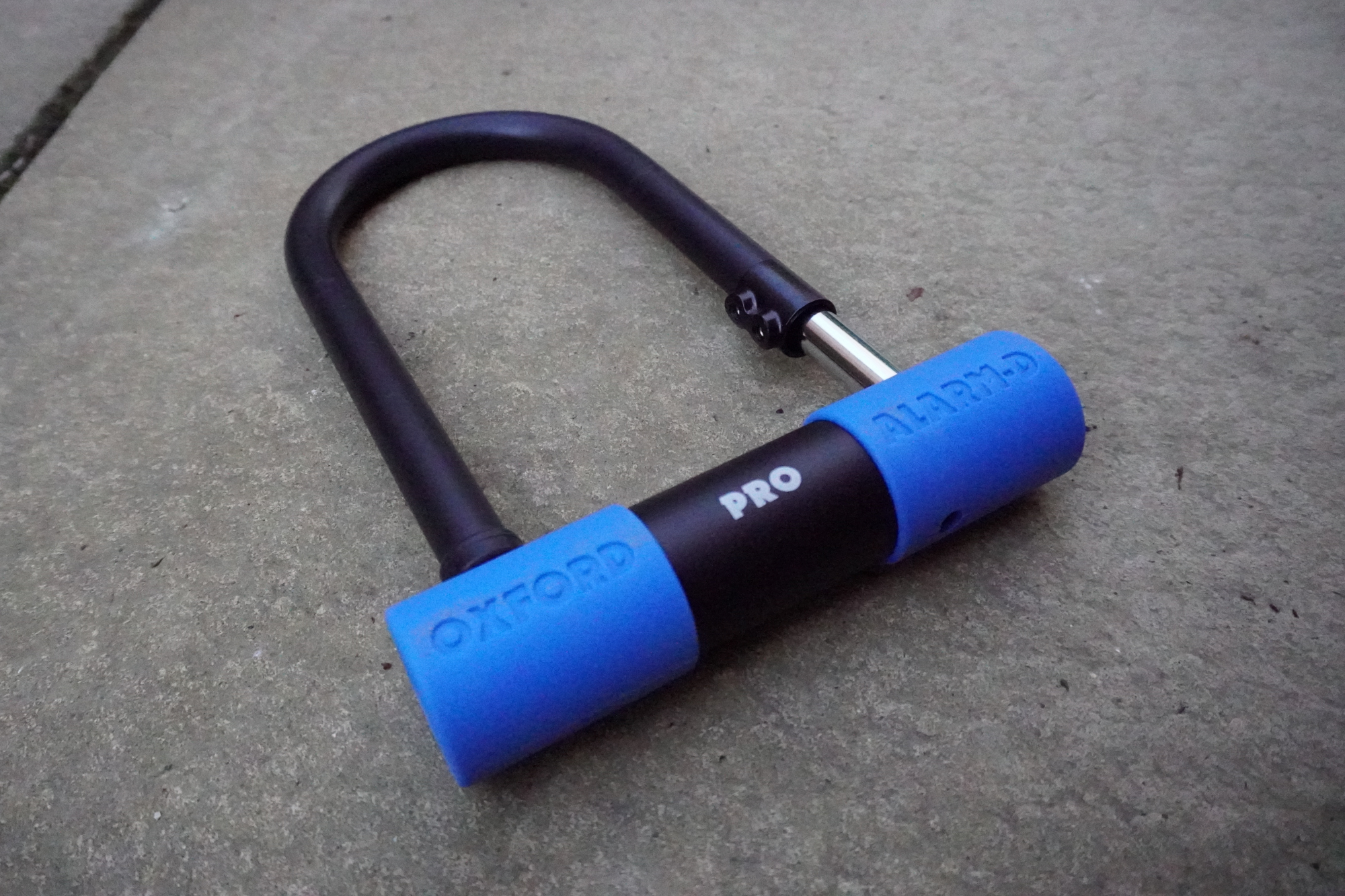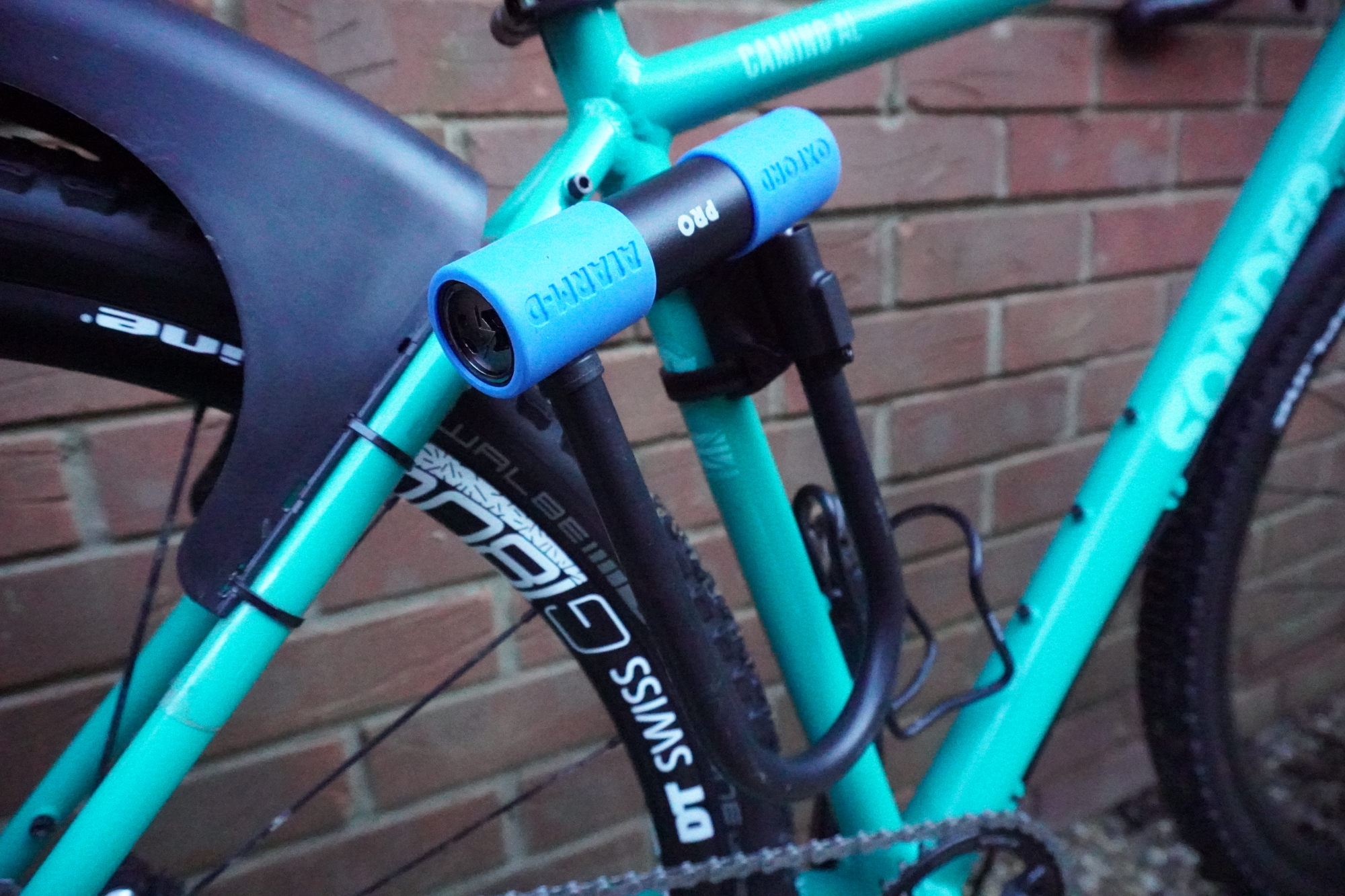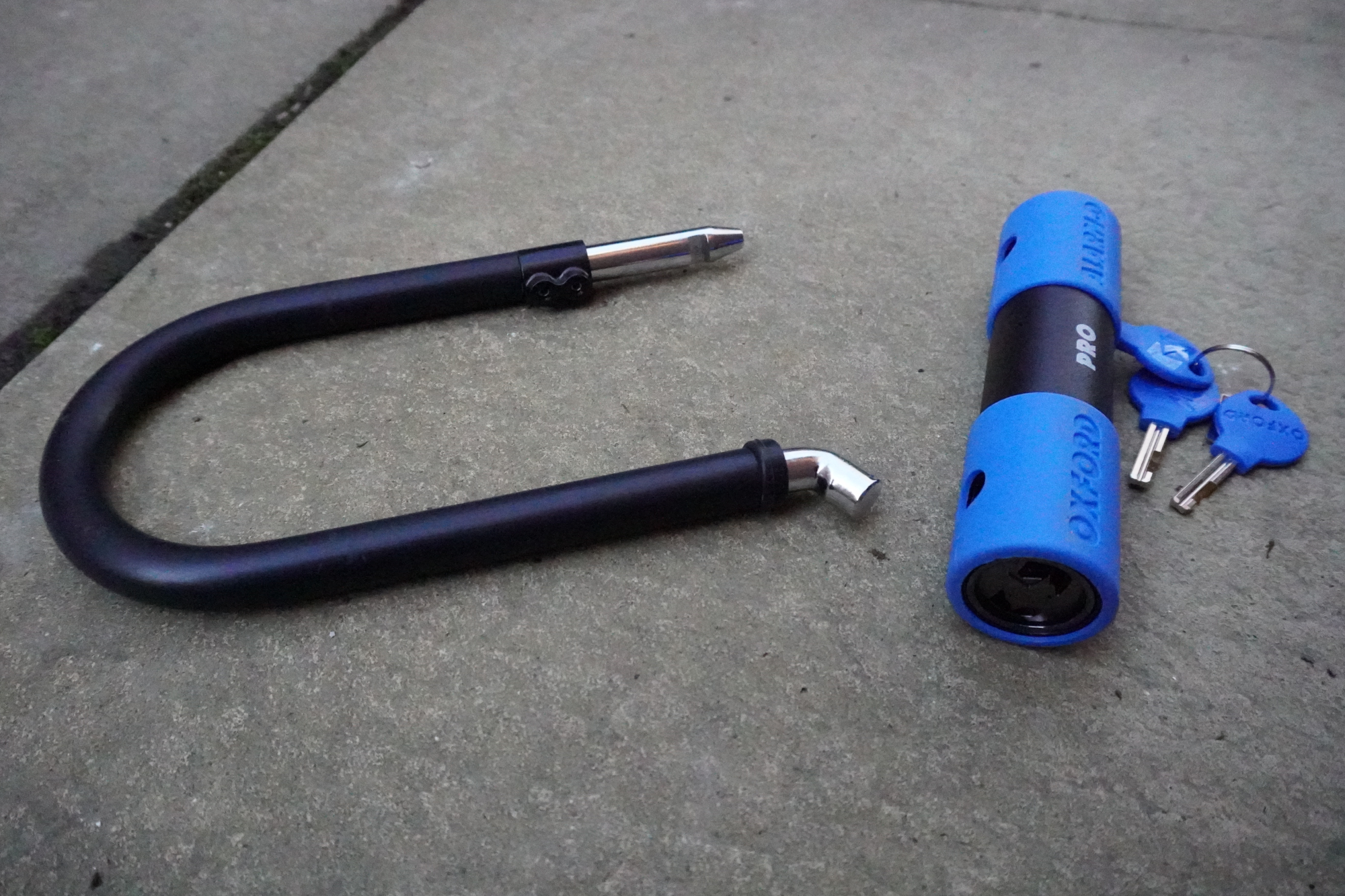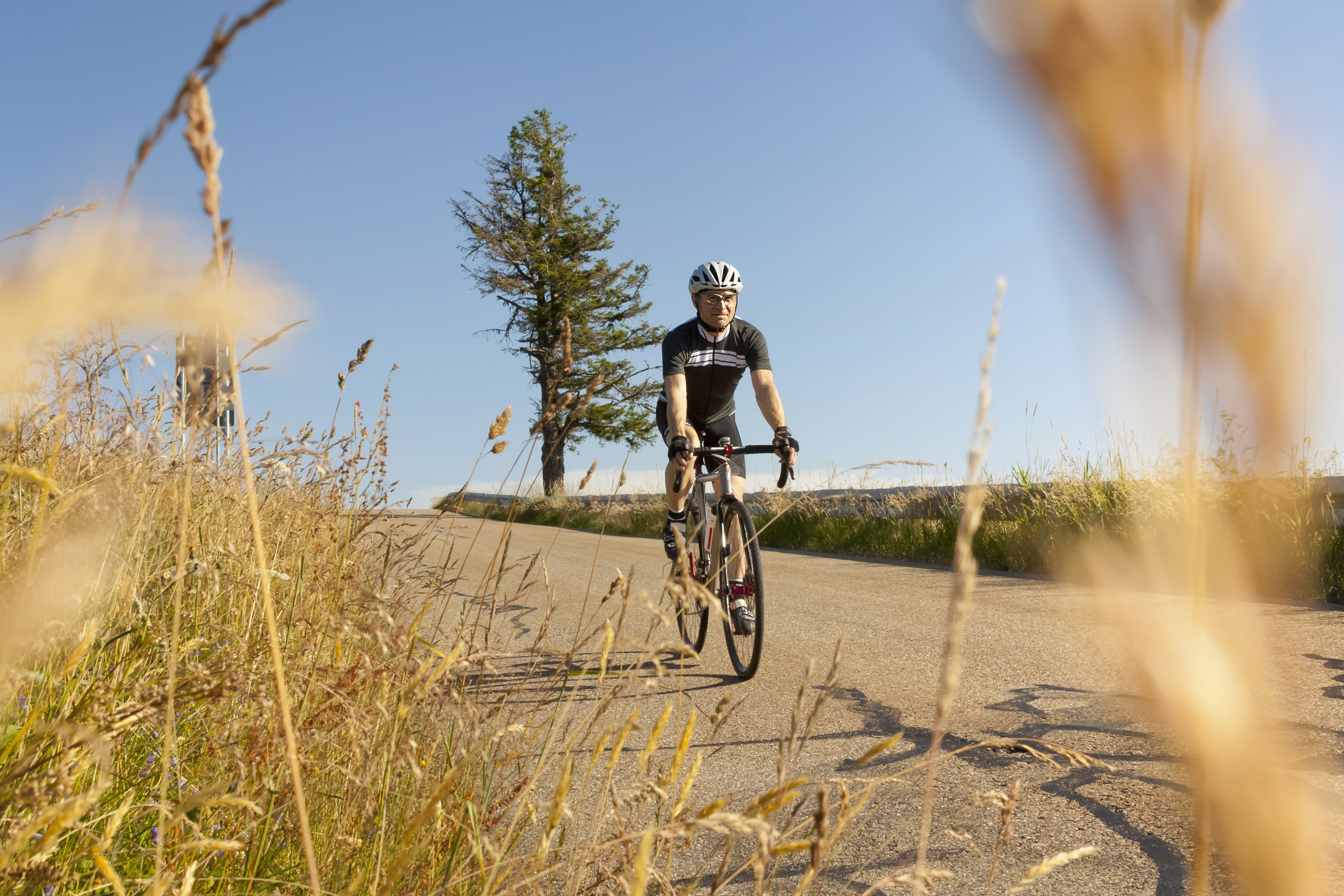Oxford Alarm-D Pro review
The Oxford Alarm-D Pro is a Sold Secure Gold rated lock, with a great alarm feature

The Oxford Alarm-D Pro is a highly versatile lock. A Sold Secure Gold rating means that it is robust and will comply with many insurance policies. Its weight, size, and bike mount mean that it is also portable enough to reasonably be used around town and on a day-to-day basis. The motion sensitive alarm is well calibrated and provides a little extra peace of mind when locking up your bike.
-
+
Well executed alarm feature
-
+
Reasonable price
-
+
Reasonable weight
-
+
User friendly shackle
-
-
Rubber cover doesn’t extend all the way across the crossbar
You can trust Cycling Weekly.

The Oxford Alarm-D Pro is a Sold Secure Gold rated D-lock with an inbuilt motion sensor and 120 decibel alarm that will sound if it detects any tampering.
The medium size, reasonable weight, along with the included bike mount, means it is well suited to everyday and around town use. But the high security rating and integrated alarm means that it is far more versatile than a slimmed down and lightweight lock.
Security
It’s a matter of fact that no lock is perfectly secure. With the right tools, knowhow, and inclination, a determined thief will always be able to break through. The three main purposes of a lock are to prevent opportunistic theft, convince more systematic thieves that there are easier targets to go for, and to comply with the wording of your bike insurance policy – so that you are at least covered if your bike is stolen.
Sold Secure is an independent lock testing company which vets the resilience of locks on the UK market. Three levels of ranking are awarded. The lowest, Bronze, means the lock is only suitable for preventing opportunistic theft. Silver is generally regarded as good for moderate crime areas and for bikes valued up to £1,000. While Gold should be used in high crime areas and for bikes valued over £1,000. It should be specified in the wording of your insurance policy which level of lock you need to use to be covered.
>>>Read more: How to lock your bike up safely
Construction
Made from 14mm “special” hardened steel, the shackle has been given a vinyl coating to help protect the paintwork of your frame. Helpfully, one of the prongs of the shackle features a bend so that the crossbar can be fitted one prong at a time, which is a significant improvement over designs that require you to line up both prongs and the crossbar exactly.
An attachment for the bike mount comes already fitted to the shackle and the system for connecting it to the bike is really quite elegant. Rather than having a clasp with a release mechanism, it is the lock itself that secures it to the mount. This does mean that you need your key to take it on and off the bike, but most of the time when you are doing that you will either locking your bike or putting it away again, which you’d need your key for anyway.

The mount attaches to the bike in one of the more user-friendly ways I’ve seen. The long straps can accommodate a huge range of tube shapes and sizes, while the bolts for tightening up those straps are quick and easy to insert. This made fitting the mount a relatively faff free experience.
The alarm is housed inside the crossbar of the lock and, by the look of it, quite secure from most attacks. To get to the battery, you need to remove the cross bar and unscrew the screw inside one of the holes for the prongs of the shackle. The battery is supposed to be long life so shouldn’t need to be changed often, but it’s a quite straightforward process when the time does come.
Dimensions of 17.3cm x 26cm give the Oxford Alarm-D Pro a lockable area of 450cm2 and this is quite sufficient for most applications. It’s wide enough to get around the majority of objects you’d want to lock a bike to and it’s long enough that reaching the bike is never really an issue. There is a version of this lock which is 32cm long and would perhaps be better if securing multiple bikes with one lock, but the length of this one is perfect for use on a single bike.
In use
The alarm function of the lock was very easy to use and it trod well the fine line between being sensitive to movement, without being irritatingly oversensitive. The alarm is set by turning the key in the barrel of the lock until you hear an clear electronic beep. If you wish to secure the lock, but not activate the alarm, such as when transporting it, you just need to turn the key twice and you’ll hear two beeps which tell you it is disarmed.
When the lock is armed, if it detects any significant movement, it will first sound a loud warning beep. If disturbed again, then it will sound two loud beeps, and only if it disturbed a third time after that will it initiate a countdown and sound the full alarm. This system of warning blasts should prevent it from going off by accident, and I never found it sounded any false full alarms during my time testing the lock. The alarm itself is loud and piercing, exactly what you’d want.

Although the alarm does provide a bit of extra peace of mind when leaving my bike locked up in town, I think the instance where it would provide me with the greatest utility is on cycle tours or when bikepacking. There is often quite a lack of suitable objects to lock a bike to when out camping, meaning that I often end up resorting to just locking bikes to each other – which isn’t particularly secure. With a motion sensitive alarm, I would be able to sleep a lot more easily in the knowledge that if someone were to tamper with the bikes, I would definitely hear about it.
Beyond the alarm function, the Oxford Alarm-D Pro performed very well in its day-to-day application. The crossbar and key barrel were easy to operate and the size of the shackle never left me frustrated. Coming with three keys meant there was plenty of spares, and it is also possible to order more should I have managed to lose all of them.
Although the shackle gets a nice vinyl coating, the crossbar only gets rubber protectors at the ends. To be fair, this is sufficient for not scratching the paintwork as it’s generally quite possible to get the lock to rest on the frame without touching the exposed metal middle of the crossbar. But it would have been nice for this not to have been a concern at all.
Value
The Oxford Alarm-D Pro’s most immediate competition comes from the Abus 440 Alarm U-Lock bike lock. But at £84.99 and only Sold Secure Silver, the Abus doesn’t compare very favourably to the Oxford lock at all, which costs just £60.99 and gets a sold secure Gold rating.
Zefal’s K-Traz U17 undercuts the Oxford Alarm-D Pro significantly, coming in at less than half the price while also getting a Sold Secure Gold rating. However, the Zefal doesn’t have an alarm, so doesn’t deliver on that aspect.

Thank you for reading 20 articles this month* Join now for unlimited access
Enjoy your first month for just £1 / $1 / €1
*Read 5 free articles per month without a subscription

Join now for unlimited access
Try first month for just £1 / $1 / €1
Get The Leadout Newsletter
The latest race content, interviews, features, reviews and expert buying guides, direct to your inbox!

After winning the 2019 National Single-Speed Cross-Country Mountain Biking Championships and claiming the plushie unicorn (true story), Stefan swapped the flat-bars for drop-bars and has never looked back.
Since then, he’s earnt his 2ⁿᵈ cat racing licence in his first season racing as a third, completed the South Downs Double in under 20 hours and Everested in under 12.
But his favourite rides are multiday bikepacking trips, with all the huge amount of cycling tech and long days spent exploring new roads and trails - as well as histories and cultures. Most recently, he’s spent two weeks riding from Budapest into the mountains of Slovakia.
Height: 177cm
Weight: 67–69kg
-
 Hayfever and your riding: how to combat it as the pollen strikes
Hayfever and your riding: how to combat it as the pollen strikesExplanations, medications and holistic measures to make your spring and summer riding more enjoyable
By James Shrubsall Published
-
 I went to Paris-Roubaix Femmes and was shocked at how it is still treated as secondary to the men’s race
I went to Paris-Roubaix Femmes and was shocked at how it is still treated as secondary to the men’s raceThe women’s version of the Hell of the North is five years old, but needs to be put more on equal footing with the men
By Adam Becket Published
-
 Broken hips, hands, and collarbones: Paris-Roubaix's lengthy injury list lays bare brutality of race
Broken hips, hands, and collarbones: Paris-Roubaix's lengthy injury list lays bare brutality of race"It probably wasn't the best idea to continue," says one of weekend's many wounded riders
By Tom Davidson Published